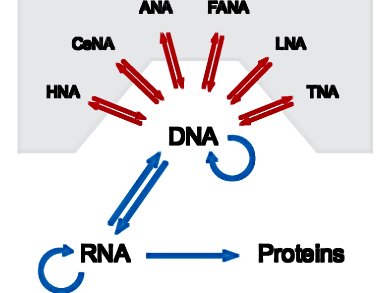Vitor B. Pinheiro and colleagues, Medical Research Council, Cambridge, UK, discuss different types of synthetic nucleic acids and propose that any polymer that can be replicated could serve as a genetic material.
Natural genetic materials, so far DNA and RNA, consist of three building blocks, namely nucleobase, sugar and phosphate, all of which can be replaced by synthetic analogs without loss of function. Incorporating alternative nucleosides such as dP and dZ that can form stable base pairs and can be efficiently replicated will expand the information coding potential. Modification of the backbone on the other hand will influence the solubility of the polymer as well as the information transfer process, as not all of these modified nucleic acids are capable of cross-pairing with the natural nucleic acids.
Combining these novel synthetic nucleobases and synthetic backbones might be promising for biotechnological purposes, such as the development of new therapies based on the interaction of sequence-specific oligonucleotides.
- Synthetic polymers and their potential as genetic materials,
Vitor B. Pinheiro, David Loakes, Philipp Holliger,
BioEssays 2013, 35 (2).
DOI: 10.1002/bies.201200135




